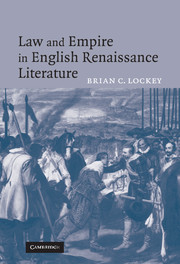Conclusion: English law and the early modern romance
Published online by Cambridge University Press: 22 September 2009
Summary
The civil-law tradition persisted temporarily within the complex system of English jurisprudence so that for a time Roman legal principles and the related discourse of natural law continued to constitute an alternative to the common-law tradition. For their part, the civil lawyers as well as some sympathetic common lawyers saw themselves as the champions of such principles, and on this basis, defended an alternative juridical sensibility. As I have shown, writers of romance occupied a unique space between the two camps. In one respect, these writers were influenced by the common-law ideology, and in quite another, their desire to imagine a universal legal foundation for English or British expansion caused them to favor the marginalized traditions of the civil law and natural law. Hence, while there may have been no formal reception of Roman law in the English common-law courts, a kind of Roman reception did in fact occur, albeit outside of established legal and political institutions.
As a way of gaining some historical perspective on this issue, it is worth briefly reviewing what the father of modern legal historiography, Frederick Maitland, famously said concerning the possible reception of the Roman law during the Renaissance. In his capacity as the 1901 presenter of the prestigious Rede lecture at Cambridge University, Maitland located the sixteenth century as a defining historical moment, not just within the history of English law, but within the history of the British Empire.
- Type
- Chapter
- Information
- Law and Empire in English Renaissance Literature , pp. 219 - 230Publisher: Cambridge University PressPrint publication year: 2006

